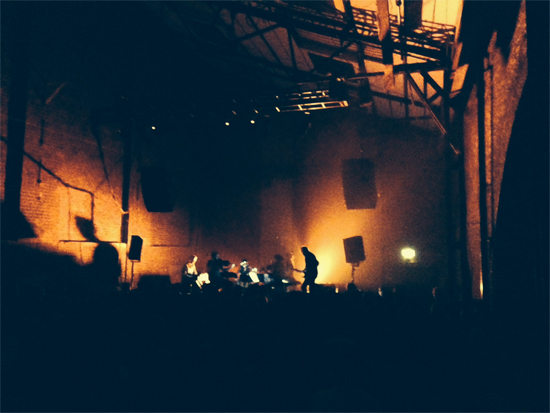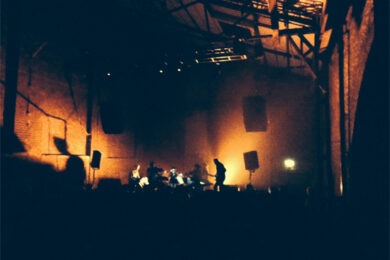Having met backstage at a Sparklehorse gig back in 2007 (with whom Wiltzie was playing), pianist Dustin O’Halloran and Stars Of The Lid drone-maestro Adam Wiltzie formed A Winged Victory for the Sullen. This month, they are in London to perform a live score at Sadler’s Wells for a new dance piece by English choreographer Wayne McGregor, entitled Atomos. Having been summoned by McGregor to score the new piece barely a few months ago, Adam Wiltzie briefly jokes about how he’s never worked so quickly before – "normally I take fourteen years to make two songs".
Tonight is the first of four warm up gigs for Atomos, allowing Winged Victory to test-drive some of the new material, while also giving their sleepy London fans a chance to see them without coughing up big bucks for a trip to Sadler’s Wells. The line-up consists of O’Halloran, Wiltzie and the same string quartet from Brussels that have, as Wiltzie puts it, "become members of the band". The crowd of some few hundred sardine-tin packed punters have totally filled out the Village Underground’s perfectly dead space, and after the brief words and a droney tune-up, they start.
What is it that makes the music so compelling? They duo craft a sound that may feel orchestral in scale, but ultimately moves at a different speed and comes from an utterly separate, blurred frame of mind. Notes are almost uniformly long, sustained and extended sometimes for minutes at a time – something Wiltzie has often taken to extreme degrees with Stars Of The Lid. O’Halloran’s piano lines feel simplistic and familiar, Chopin-esque in their gentle delivery and almost childlike in their apparent familiarity. Across the set moments are discernible from the group’s self-titled 2011 album, while other pieces are clearly alien and new departures from the project’s normal drift. Adam Wiltzie’s guitar is delayed, reverbed, echoed and blurred into its now recognizably alien, almost tanpura-like electric drone – and yet the image of him on stage left, silhouetted in a rock god pose, jarringly clashes with the gentle ebb of the sound. It’s one of the defining characteristics of the show, as the sight of the seven musicians playing only occasionally seems to correlate with the sounds they create. A violinist’s arm sweeps upwards, a hand falls onto a keyboard, a string is plucked – but the gap between sight and sound remains.
Opening with a deep, dark synth duet between O’Halloran and Wiltzie, violins, viola and cellos are added, segueing into the first gentle piano notes and panoramic drones from O’Halloran and Wiltzie respectively. The various instrumental lines interlock, and gradually rise and rise, both climbing scales and gradually cranking up the volume to reach a controlled crescendo. Elsewhere, instruments are highlighted – like the cello hovering over the second piece’s introduction – and samples are looped endlessly forming the music’s deep bed (like the seamless organ grind of ‘Steep Hills Of Vicodin Tears’).
The newer sounds introduced – presumably in new compositions for Atomos – are relatively few in number, but stand out amidst the set’s typical oceanic ebb, and hint at a new appreciation for darkness and menace. Sub-bass stabs underpin one piece, almost flagrantly inharmonious and uncharacteristically conspicuous amidst Winged Victory’s usual placid ambience. Later, the semblance of an actual rhythm arises, in the form of an arpeggiated synth melody that is mimicked by strings, compounded by other keyboards, and eventually dismissed back into the ether. Still, the most compelling moment is the run through of their self-titled album’s opening track, ‘We Played Some Open Chords and Rejoiced’, the simplicity of which remains utterly daunting, especially live where O’Halloran’s skilful keyboard touch can make or break the handful of notes in the piece.
For an encore, Wiltzie picks up the mic and sings a Sparklehorse cover in tribute to the late Mark Linkous. His voice is fragile and off-key, but the marriage of words to the music and semi-underground setting coalesce oddly well ("I woke up in a burnt out basement/Sleeping with metal hands"). Finally the group’s founding pair leaves the stage for the closing piece – apparently the finale in Atomos – a dramatic slice of slow motion minimalism for strings.
Improvising guitarist Loren Connors has cited Rothko as one of his major influences, and perhaps the same thinking applies here. Aside from the lack of an overarching auteur – this music has been composed far more democratically – A Winged Victory For The Sullen’s most major departure from orchestral music is the music’s sheer abstraction. A Mahler tone poem or Debussy ‘symphonique’ tends to evoke imagery in the mind, be it the Austrian countryside or la mer. Mahler himself even remarked "Don’t bother looking at the view – I have already composed it." This music however, doesn’t paint landscapes or portraits, but rather expressionist shades. A Winged Victory For The Sullen – like Loren Connors or Rothko – is not making music ‘of the Earth’, or indeed anything external. It is the physical manifestation of that inner space, and with it, they quietly continue to make some of the most inventive and powerfully luminescent sounds being played today.



